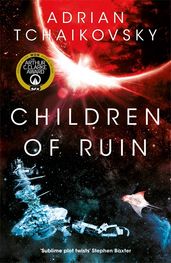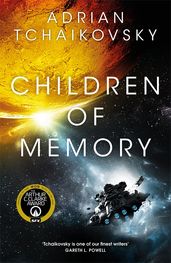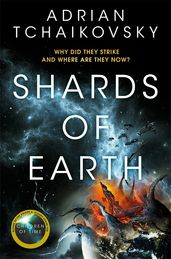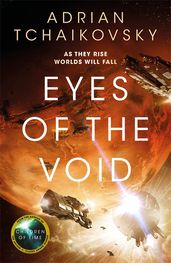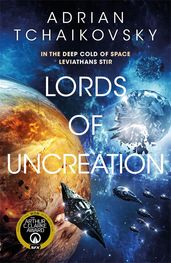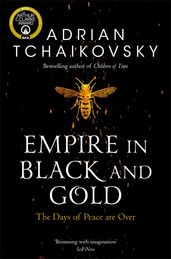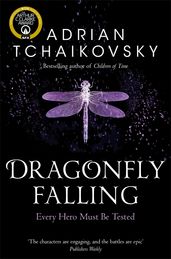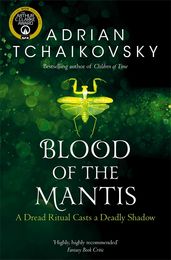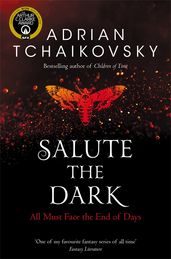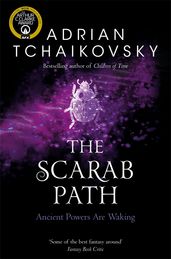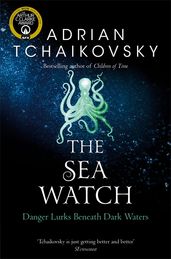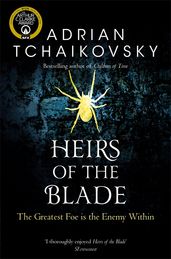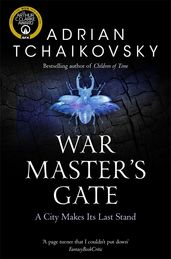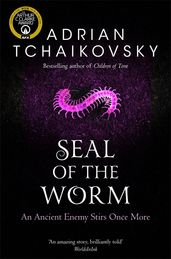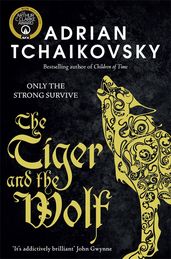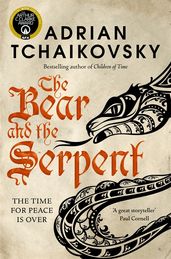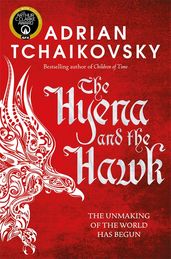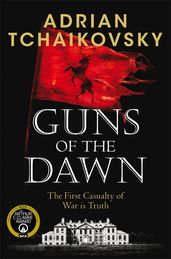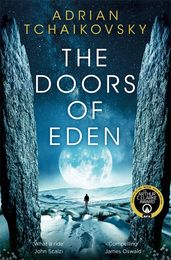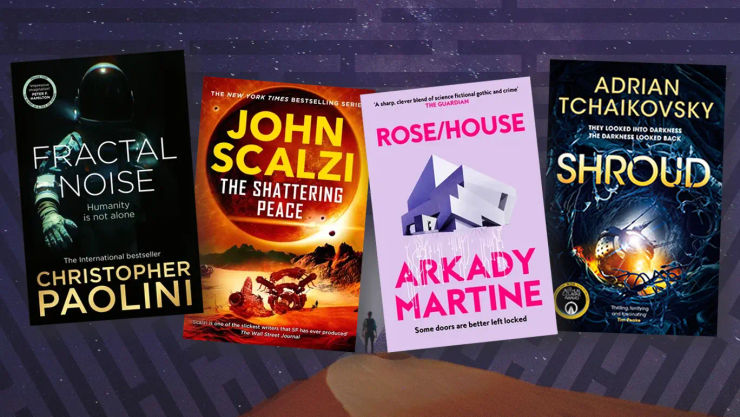Adrian Tchaikovsky's books in order: a complete guide
From super-soldiers to sentient spiders, David Barnett gives us a guide to the world(s) of Adrian Tchaikovsky's books, one of the UK's foremost science fiction and fantasy authors.

Journalist David Barnett introduces the boundless work of Adrian Tchaikovsky, the Leeds-based fantasy writer who takes his readers on epic voyages through time and space.
An affable author with a penchant for distinctly scary insects, perhaps fed by his study of zoology, Tchaikovsky is a prolific creator. For readers wanting more detail on this epic oeuvre, discover our guide below to Adrian Tchaikovsky's books in order.
Adrian Tchaikovsky is, if you’ll excuse the painfully obvious pun, a maestro of science fiction and fantasy.
His work is on an epic scale, crossing galaxies and tackling the big themes – aliens, artificial intelligence, the relationship between magic and technology, the divide between gods and mortals. Oh, and fair warning: spiders. Lots of spiders. Adrian Tchaikovsky loves spiders almost as much as you hate them.
Tchaikovsky, born in Lincolnshire in 1972, had a varied career before he became a full-time writer in 2018. Studying zoology and psychology at Reading, he then worked for a solicitor’s in Leeds, West Yorkshire, where he now lives and cuts a tall, imposing figure.
Mephistophelian beard notwithstanding, he’s also a thoroughly nice chap if you run into him at a con or event, if somewhat a little over-fond of creepy-crawly sort of things.
Take Tchaikovsky’s series Shadows of the Apt, which began with his debut novel Empire of Black and Gold, published in 2008. This kicked off what would be a ten-book series and introduced his highly original universe, populated by different humanoid races with the characteristics of insects.
The idea first came to him when he was at university and running a role-playing game called Bugworld – its basic scenario of an insectoid race under attack from a wasp empire formed the basis of his fictional world, populated by the technological Apt and the magic-using Inapt.
That’s a very simplistic precis of Tchaikovsky’s thoughtful, nuanced backdrop to stories that are both high-concept and character-driven.
While the Shadows of the Apt series successfully combined science and magic, for his next series, which began with 2015’s Children of Time, Tchaikovsky concentrates more on science fiction tropes that are at once familiar and yet wholly his own.
Children of Time, and its 2019 sequel Children of Ruin, look at the concept of terraforming distant alien planets. In the first book, a human mission plans to introduce ape species to a new world and infect them with a virus designed to speed up evolution and elevate their intelligence within hundreds of years. However, things do not go quite according to the script, resulting in a race of sentient spiders who share the planet with the human colonists.
Tchaikovsky has scooped a clutch of awards for his work, including the Arthur C Clarke Award for Children of Time and the BSFA Best Novel gong for its sequel. While that output over 13 years would be respectable for any author, it only scratches the surface of Tchaikovsky’s bibliography, which also includes the standalone novels Doors of Eden (2020), about parallel worlds, Cage of Souls (2019), a dying Earth novel, the 2016 fantasy Spiderlight (there he goes again . . . ) and the iron age fantasy trilogy Echoes of the Fall.
Tchaikovsky has also written another new series, The Final Architecture, which begins with Shards of Earth. When Earth is all but destroyed by an alien race, mankind fights back by endowing a human strike force with enhanced abilities. The alien invaders abruptly disappear, and these super-soldiers such as the main character Idris are surplus to requirements in a universe populated by the shattered dregs of humanity. But have the aliens really gone for good?
Adrian Tchaikovsky is one of Britain’s leading science fiction and fantasy authors, and Shards of Earth is a perfect jumping-in point if you’ve yet to discover this brightest of literary stars. And there’s so much more to explore from his back catalogue when you’ve finished. You never know, you might even learn to love spiders as much as he does . . .
What is Adrian Tchaikovsky's next book?
Children of Strife
by Adrian Tchaikovsky
The next novel from Adrian Tchaikovsky is, excitingly, a new installment in the Arthur C. Clarke Award award-winning Children of Time series. Centuries ago, a maverick team terraformed a distant planet with terrible and unexpected results. Now, a scientist called Alis has rediscovered this lost outpost. But the rest of her crew has disappeared. And so, she must venture into the darkness of the planet below.
What are the latest Adrian Tchaikovsky books?
Shroud
by Adrian Tchaikovsky
New planets are fair game to asset strippers and interplanetary opportunists – and a commercial mission to a distant star system discovers a moon that is pitch black, but alive with radio activity. Its high-gravity, high-pressure, zero-oxygen environment is anathema to human life, but ripe for exploitation. They named it Shroud. Under no circumstances should a human end up on Shroud’s inhospitable surface. Except a catastrophic accident sees Juna Ceelander and Mai Ste Etienne doing just that. If they escape, they’ll face a crew only interested in profiteering from this extraordinary world. If they escape. . .
Made Things
by Adrian Tchaikovsky
Made Things is a dark yet whimsical fantasy tale full of magic, half-mages and puppet companions. Street thief Coppelia is forced to start working for a local crime lord, who wants her help in high-stakes heist. This could either make her fortune, or destroy her life. But then a surprising discovery threatens to tear their world apart, and they must face down a threat to the whole city of Fountains Parish. This edition features a bonus short story, Precious Little Things.
The Children of Time series in order
Children of Time
by Adrian Tchaikovsky
In the far future, the Earth is dying. A desperate envoy is sent into deep space to search for the remnants of an experimental terraforming scheme. They discover the greatest treasure of the past age: a glorious new Eden. But the planet is not waiting for them, pristine and unoccupied. In humanity’s absence, a new species has thrived – turning this second Eden into our worst nightmare. Now two civilizations will do whatever it takes to survive, as the fight for the planet begins.
Children of Ruin
by Adrian Tchaikovsky
Humanity’s best scientists once took to the stars with a terraforming programme. They found the perfect planet, Nod – except that alien life had already flourished. It was their mission to overwrite it. Then humanity’s empire fell, and the programme’s ultimate decision was lost. Years later, a fragile coalition of humankind and spiders detect radio signals from space. It could be old cousins from Earth, so they dispatch an exploratory vessel. But those ancient terraformers woke something on Nod, and it’s been waiting for them.
Children of Memory
by Adrian Tchaikovsky
The unmissable third instalment in the Children of Time series spans generations, species and galaxies. Years after arkships were sent to establish new outposts following the failure of Earth, a fragile colony has managed to survive on Imir. But, existence here is a far cry from the paradise the initial mission intended. When strangers appear, society on Imir begins to fracture as neighbour turns against neighbour. But, perhaps some other intelligence is also at work, toying with colonists and space-fearing scientists alike . . .
The Final Architecture series in order
Shards of Earth
by Adrian Tchaikovsky
Eighty years ago, the alien Architects destroyed Earth. Many escaped, but millions more died. So mankind created super-soldiers to combat the enemy. Then the Architects disappeared, and heroes like Idris were forgotten. Idris has neither aged nor slept since the war. He scrapes by on a salvage vessel to avoid unwanted attention. Then he and his crew discover a work of the Architects, abandoned in space. Hunted by gangsters, cults and governments, they must race across the galaxy to find answers – and prepare themselves for war.
Eyes of the Void
by Adrian Tchaikovsky
Thoughtful, inventive and high octane, Eyes of the Void is the second instalment of Adrian Tchaikovsky's Final Architecture space opera trilogy. Following eighty years of shaky peace, the alien enemy is back, conducting a terrible one-sided battle and consuming entire planets. Nobody is safe, and the Human Colonies are in chaos. As the threat grows ever closer, Idris has the chance to turn the tide for humanity. But to do so, he must face his demons in unspace. And what he finds there will change everything . . .
Lords of Uncreation
by Adrian Tchaikovsky
In the final high-octane instalment of Adrian Tchaikovsky's Final Architecture space opera trilogy, Idris Telemmier has uncovered a secret that changes everything – the Architects’ greatest weakness. A shadowy Cartel scrambles to turn his discovery into a weapon against these alien destroyers of worlds. But between them and victory stands self-interest. The galaxy’s great powers would rather pursue their own agendas than stand together against this shared terror. For all fans of Adrian Tchaikovsky, this is a characteristically gripping, thought-provoking and energetic finale not to be missed.
Shadows of the Apt series in order
Empire in Black and Gold
by Adrian Tchaikovsky
For decades, the Lowland’s city states have only known peace. But all that is about to change. A distant empire has been conquering neighbours with its vast, highly trained armies. Now it sets its eyes on a new prize: the city states. Spymaster and statesman Stenwold Maker can see the danger coming. But as the empire marches closer, no one else seems convinced. It’s up to him to save his home – if he can survive.
Dragonfly Falling
by Adrian Tchaikovsky
The Wasp Empire’s armies march towards the city of Tark. Alongside their ant-Kinden brethren, Sotho and Tark prepare for battle against a force unlike any other. Meanwhile, Stenwold Maker’s life is under threat. The Empire have deemed him too dangerous to live, and so they set out to eliminate him, along with his beloved city of Collegium. As the Empire’s troops bear down on the city, the young Wasp Emperor seeks another, darker goal. And its success could spell the end for the Lowlands.
Blood of the Mantis
by Adrian Tchaikovsky
Achaeos the seer has finally discovered the location of the stolen Shadow Box. But soon the magical artefact could be lost to him forever. Meanwhile, Stenwold and his followers are running out of time, as they try to gather allies ahead of the Empire’s next move. If he fails, the Empire will crush every city in the Lowlands by year’s end. But worse is yet to come. Should the power-hungry Wasp Emperor get hold of the Shadow Box, nowhere will be safe.
Salute the Dark
by Adrian Tchaikovsky
War is on the horizon, as the Wasp Empire marches towards the city of Collegium. Preparing for battle, Stenwold Maker must untangle loyalties to distinguish allies from false friends. Tisamon the Weaponsmaster prefers a more direct approach – to face the Wasp Emperor himself and stem the bloody tide. Yet a sinister force may be manipulating him from the darkness. With the Shadow Box in his grasp, the Wasp Emperor can begin his dark ritual to gain immortality. However, the sorcerer Uctebri has other plans...
The Scarab Path
by Adrian Tchaikovsky
The war with the Wasp Empire has ended in bitter stalemate, and Cheerwell Maker is haunted by ghosts from the past. Meanwhile, the Wasp Empress is already regaining control over her renegade imperial cities. Only her consort, former spymaster Thalric, knows the sinister truth behind her power. And when assassins come for him, he finds his life and loyalties under threat once more. Both Cheerwell and Thalric are drawn to the ancient city of Khanaphes. Yet a terrible secret lies entombed beneath its stones.
The Sea Watch
by Adrian Tchaikovsky
A fragile peace holds over the Lowlands. Yet Stenwold Maker knows the Empire will return for Collegium. As he prepares the city for battle, a hidden threat works against him. Collegium ships are being attacked and sunk by pirates, while others simply vanish. Amidst rumour and deception, Stenwold’s allies are falling away – even as the Empire waits to strike. But they’re not the only power with an eye on Collegium. And its military might may not be able to stop the forces gathering in the shadows.
Heirs of the Blade
by Adrian Tchaikovsky
Haunted by her crimes, Tynisa is on the run. But among the crumbling provinces of the Dragonfly Commonweal, she can’t escape her past. Her father’s ghost is hunting her down. As Tynisa flees, the Wasp Empire closes in on the city of Khanaphes. From the jewel of the ancient world, the Empire’s soldiers seek conquest and glory. However, Empress Seda has greater aspirations. She sees herself as heir to all the old powers of history, and seeks the ultimate prize.
The Air War
by Adrian Tchaikovsky
Chaos erupts, as the world heads towards an inevitable collision. While students in Collegium argue politics, spies ready their knives and troops muster at the border. Nowhere is safe – and no one can be trusted. At the heart of the Empire, pilots complete their secretive training and Empress Seda rallies her forces. As the heir to two worlds, she intends to claim her birthright, and nothing will stand in her way. Even if it means an unimaginable war.
War Master’s Gate
by Adrian Tchaikovsky
The Wasp Empire is relentlessly advancing towards Collegium. On the other side of the wall, Stenwold Maker prepares the city for battle. He has triumphed before, but a terrifying new aerial weapon could devastate them. Yet, far from the city, Empress Seda seeks something that could turn the tide of war in her favour – a lost power from the old world. Cheerwell Maker is determined to stop the Empress from claiming it. But their showdown could awaken a far deadlier enemy...
Seal of the Worm
by Adrian Tchaikovsky
Finally, the Empire is victorious. But it has come at a terrible price – one which Empress Seda is only beginning to reckon with. The Seal is shattered, and the Worm is stirring towards the light for the first time in a millennia. It will consume everything. Faced with destruction, Seda must turn towards an extreme solution to lock the Worm back into the darkness. But if she does the unthinkable to save the world, then who will save the world from her?
Echoes of the Fall series in order
The Tiger and the Wolf
by Adrian Tchaikovsky
In the northern crown of the world, Maniye is an outcast. Her father may be the Wolf’s chieftain, but her mother was queen of the Tiger. And these shapeshifting clans have been enemies for generations. However, Maniye has a secret – she can transform into both wolf and tiger shapes. Unable to disown half her soul, Maniye escapes, taking a Wolf prisoner with her. But the future is uncertain, as a dark shadow circles the land, eclipsing even the Wolf chieftain’s own ambitions for war.
The Bear and the Serpent
by Adrian Tchaikovsky
Maniye has been named Champion of her people, though they’re still undecided if she’s an asset or a threat. To buy time, Maniye heads south with Prince Tecuman, to help him claim his crown from his twin sister. Instead, she stumbles into the heart of a political storm. In the face of impending danger, Loud Thunder and his bear clan are attempting to unite the northern tribes. An ancient adversary is preparing to strike, and none will be spared. But not everyone is convinced – and time is running out.
The Hyena and the Hawk
by Adrian Tchaikovsky
Out of the darkest myths, the Plague People have emerged. They obliterate villages, bringing with them a terror that destroys minds. In their quest to remake the world, nothing is safe. The true people must fight back. Clans across the world unite, as heroes and leaders wage a war unlike any they’ve known. But even ten thousand spears may not be enough to turn the tide in their favour. The fate of the true people and their world rests on a knife edge.
Standalone books in order
Guns of the Dawn
by Adrian Tchaikovsky
For generations, peace reigned over Denland – until revolutionaries assassinated their king. Next, they clashed with Lascanne, their neighbour. Both countries are now locked in fierce war, pitching war machines against warlocks. Genteel Emily Marshwic has lost much to the war. Then the call for more soldiers comes for her. Alongside other conscripted women, she finds herself on the battlefield, braving the harsh reality of warfare. But she begins to doubt her country’s cause, and her choices could determine the fate of these two nations.
The Doors of Eden
by Adrian Tchaikovsky
Four years ago, Lee and Mal went looking for monsters on Bodmin Moor. Only Lee returned. When Mal miraculously reappears, Lee can’t believe it. But Lee isn’t the only one with questions. MI5 agent Julian Sabreur is investigating an attack on a top physicist, and his only clue is footage of a woman who supposedly died on Bodmin Moor. Mal claims she’s been lost in parallel earths, populated by extraordinary creatures. Now the walls between them are collapsing – and anything could come through.
Service Model
by Adrian Tchaikovsky
Want someone else take on your domestic tasks? Make the dinner? Do whatever you ask? You need CharlesTM, the latest in robot servant technology. Just hope he doesn't develop a fault and kill you. . . After an unfortunate incident, Charles finds himself without a master and without purpose. Fleeing the scene of his crime, he discovers a wider world where human societal structures are disintegrating, and the robot system built to support them is finding itself increasingly obsolete. Can he help fix the world, or is it too badly broken?
Alien Clay
by Adrian Tchaikovsky
Professor Arton Daghdev is exiled to an extrasolar labour camp on Kiln due to his political activism. There, he’s condemned to work under an alien sky until he dies. Kiln boasts a ravenous, chaotic ecosystem like nothing seen on Earth. The monstrous alien life interacts in surprising ways with the human body, so Arton will risk death daily. Yet, amidst it all, the ruins of an alien civilization are a beacon of hope. On Kiln, history's greatest space discovery awaits - an alien species vanished, leaving behind a secret that could redefine life and intelligence, and potentially, liberate Arton. Alien Clay is a thrilling far-future adventure.
Author photo yb Tom Pepperdine




